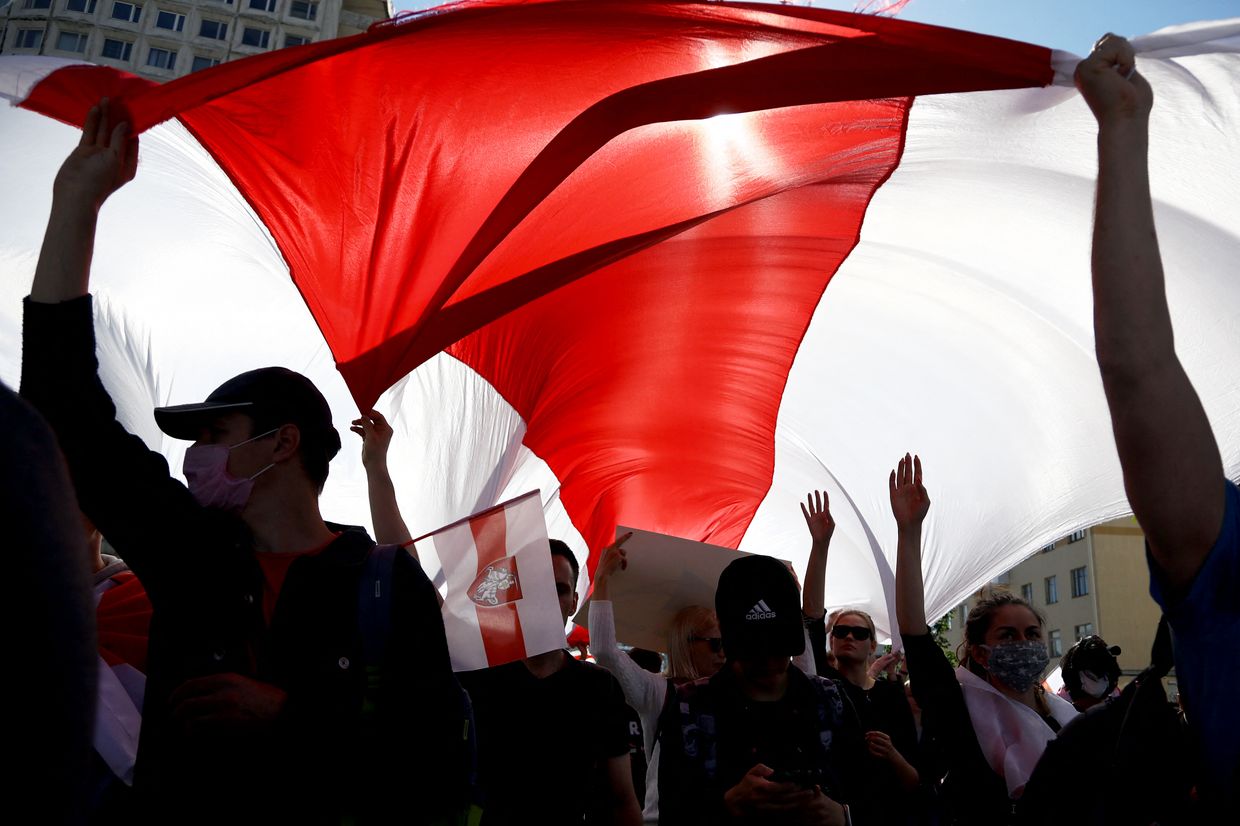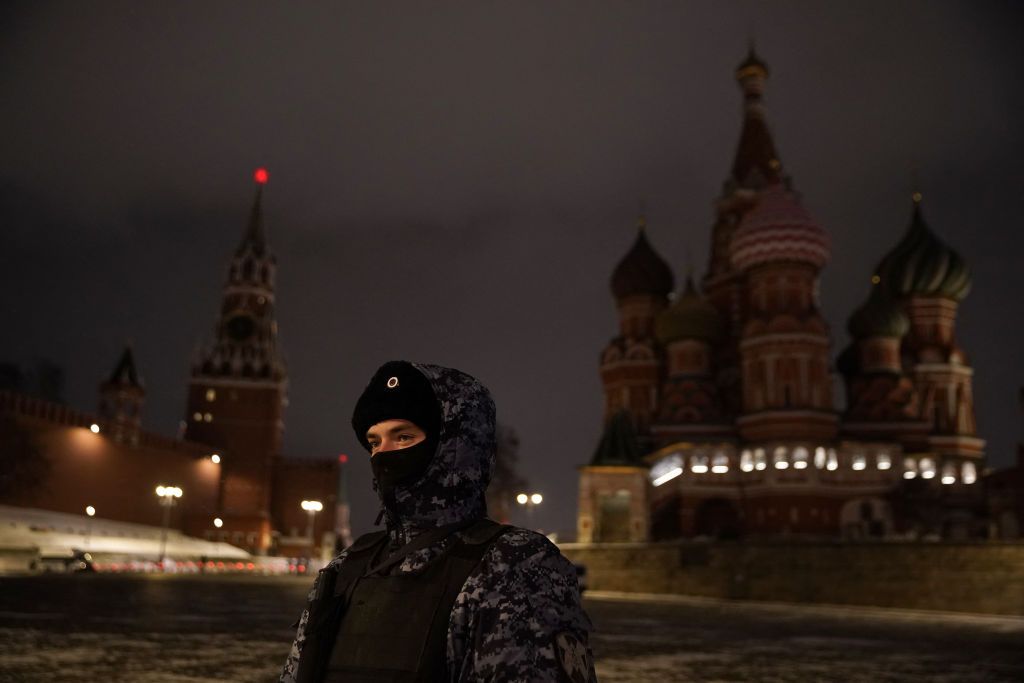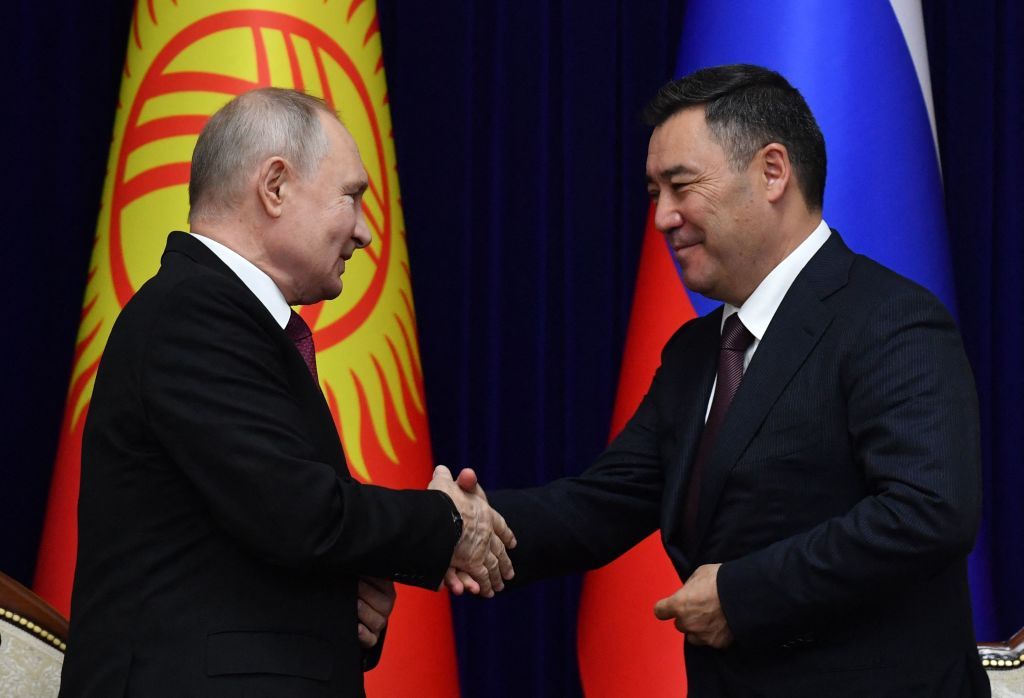Belarus Weekly: Lukashenko declares intention to run for 7th term in 2025

Tightly controlled parliamentary and local elections in Belarus, condemned internationally and dismissed by the opposition, ended on Feb. 25, bolstering dictator Alexander Lukashenko's decades-long rule.
Amidst criticism of the "sham" vote, Lukashenko has declared he will run in the 2025 presidential elections.
Western democracies impose new sanctions on Belarus on the second anniversary of Russia's invasion of Ukraine, but have yet to harmonize restrictions with those imposed on Russia, or close loopholes exploited by the two regimes.
Lithuania says it will close two more border crossings with Belarus.
UN experts have urged Belarus to release cancer-struck veteran politician Ryhor Kastusiou, saying the conditions of his detention may amount to torture.
European diplomats in Minsk decry the closed trial of a Catholic activist in Belarus as "unfair" and "politically motivated."
Sham elections wrap up in Belarus, solidifying dictator Lukashenko’s grip on power
Tightly controlled Belarusian parliamentary and local elections, condemned by the West and dismissed as a farce by the country’s opposition, ended on Feb. 25, further solidifying Belarusian dictator Alexander Lukashenko’s grip on power.
The first electoral campaign since the fraudulent 2020 presidential elections in Belarus were held under the strict control of armed police and rapid-response teams, accompanied by propaganda, and threats of arrest if there was any disruption at polling stations.
Ongoing repression and absence of independent observers yielded a predictably satisfying result for Lukashenko, who has been clinging to power for 30 years.
Polling stations opened for early voting on Feb. 20, allowing, according to Human Rights activists, for the possibility of vote manipulation as the ballot boxes remained unobserved for five nights.
An observation mission founded by Viasna Human Rights Center and the Belarusian Helsinki Committee reported that students, soldiers, teachers, and other government-dependent civil servants were forced to vote under threat of financial or disciplinary punishments. Human rights advocates also reported that there were detentions at polling stations.
For the first time, Organization for Security and Cooperation in Europe (OSCE) election observers were not permitted to monitor Belarusian elections.
OSCE observers were replaced with friendly officials from the Parliamentary Assembly of the Russia-led Union State and Commonwealth of Independent States, who did not reveal any violations of the voting process.
All but four pro-government parties – Belaya Rus, the Communist Party, the Liberal Democratic Party, and the Party of Labor and Justice – were denied re-registration.
Belarusians abroad were deprived of the right to vote in the elections.
Alleging that the number of Belarusian citizens outside the country is too small to influence the outcome of the poll, the Central Election Committee suggested that exiled Belarusians cast their vote at a polling station in Minsk reserved specifically for non-resident citizens.
The leader of the democratic Belarusian opposition, Sviatlana Tsikhanouskaya, called for a boycott of the elections, saying, “There’s not a single candidate who supports real changes on the ballot. The regime has allowed only its puppets to participate in the ‘election.’”
The Central Election Commission of Belarus claimed an unprecedented 41.71% of over 6.9 million voters cast their ballots in early voting, surpassing the turnout on the main voting day on Feb. 25. The total voter turnout hit 73%, according to the commission.

The Kyiv Independent can’t verify the numbers.
Prior to the election, Belarusian independent media Nasha Niva published a prediction of the new parliament line-up, basing their judgment on the candidates’ allegiance. The predictions showed 97% accuracy, with only three out of 110 names on the list failing to win.
The U.S. Department of State condemned the “sham” parliamentary and local elections in Belarus, stating that they “were held in a climate of fear, under which no electoral processes could be called democratic.”
PACE President Theodoros Rousopoulos slammed the vote as a “travesty of democracy,” pointing to a lack of freedoms of speech, assembly, and association.
According to PACE estimates, between 200,000 and 500,000 Belarusians who left the country following the fraudulent presidential elections of 2020 and Belarus’ involvement in Russia’s aggression against Ukraine were deprived of the right to vote. For Lukashenko’s opponents, returning to Belarus to vote entails the risk of arrest. According to human rights campaigners, 207 Belarusians were detained upon returning home in 2023.
Lukashenko announces he will run for presidency in 2025
Belarusian dictator Alexander Lukashenko, in power since 1994, has said he will run in the upcoming 2025 presidential elections, a state-owned broadcaster reported on Feb. 25.
After casting a vote during the sham parliamentary elections, Lukashenko made contradictory comments to the press regarding his plans for the 2025 elections.
“Tell them (the exiled opposition) that I’ll run,” Lukashenko told a BelTA state news agency correspondent. “No one, no responsible president, would abandon his people, who have followed him into battle.”
But when asked if his announcement amounted to the beginning of the new electoral cycle, Lukashenko took a step back, saying that much could change in the forthcoming year.
He said he would focus on working thoroughly throughout this year to build his legacy if he decides not to run.
Lukashenko is known for making contradicting statements, often saying that he might run for a next term – but only “if the Belarusian people wanted him to.”
In November 2019, Lukashenko announced his ambition to run again, but also said he was ready to vacate the position: “I will not hold on to the seat if you refuse to trust me,” he told the press at the time.
But when Belarusians took to the streets in 2020 to demand a recount of the elections, they were met with unprecedented police brutality. Should he decide to run again, the 2025 elections would be Lukashenko’s seventh presidential race.
February’s parliamentary elections were the first major political campaign since 2020, and were held amidst an ever-growing crackdown.
Experts viewed the 2024 vote as a rehearsal for the 2025 presidential elections.
West slaps new sanctions on Russia, Belarus on second anniversary of Russia’s full-scale invasion of Ukraine
Eight factories and seven individuals in Belarus have been targeted in the new round of sanctions from the European Union, the United Kingdom, the United States, and Australia against Russia and its closest ally, Belarus, coinciding with the second anniversary of the Kremlin’s full-scale invasion of Ukraine.
The EU Council adopted its 13th sanctions package against Russia on Feb. 23, including 106 individuals and 88 entities responsible for actions undermining or threatening the territorial integrity and independence of Ukraine.
Among the military and defense sector entities supporting the Russian invasion, the EU listed Belarusian optoelectronic manufacturer Peleng and its head, Valery Shatsila, as well as the Orsha Aircraft Repair Plant, with its director, Pavel Sluchak.
For kidnapping Ukrainian children, the EU sanctioned Dzmitry Shautsou, the head of the Belarusian Red Cross branch, paralympian Aliaksei Talai and his charity, and Dzmitry Dziamidau, the head of the regional authorities in Navapolatsk.
The U.S. Treasury’s Office of Foreign Assets Control (OFAC) introduced restrictions on the 558th Aviation Repair Plant in Baranovichi, and its head, Pavel Pinigin, for assisting the Russian military-industrial complex. Talai was also slapped with personal sanctions over his alleged involvement in deportations.
The United Kingdom placed restrictions on missile producer Precision Electromechanics Plant and microelectronics manufacturer Planar.
The Australian government placed restrictions on Horizont, a consumer electronics holding, Volatauto, a producer of automotive equipment for military use, and microelectronics plant Planar.
Lukashenko, a staunch ally of Russia's Vladimir Putin, provided Belarusian territory for Russia’s assault on Ukraine in 2022, offering the Russian army logistics and medical services, as well as supplying Moscow with weapons.
Soon, Belarus became a gateway for sanctioned goods on their way to Russia. Norwegian risk consultancy Corisk estimates that 10 billion euros ($10.8 billion) worth of goods reached Russia via Belarus in 2022-2023.
Lithuania shuts down two more border crossings with Belarus
Lithuania will shut down another two of its six border crossings with Belarus starting from March 1, Lithuanian National broadcaster LRT reported.
The Lithuanian government on Feb. 21 approved a National Committee for Crisis Management recommendation to shut down the Lavoriskes and Raigardas border crossings, bringing the total number of remaining operating checkpoints to two. In addition, crossings by pedestrians and cyclists at the remaining Medininkai and Salcininkai checkpoints will be suspended.
Lithuania will also gradually reduce the number of permits for passenger transportation issued to Belarusian and Lithuanian bus carriers, and limit the boarding and disembarking of passengers at the railway border control point Kena, which is used to reach the Russian exclave of Kaliningrad.
Lithuanian Interior Minister Agne Bilotaite said the shutdown proposal was “timely and necessary.” She said Lithuania faces an increased flow of goods, transport, and people as two other European states bordering Belarus, Poland and Latvia, shut all but one checkpoint each.
“A lot of resources are needed to control (crossborder) flows, prevent smuggling, ensure international sanctions (are enforced), and reduce traffic safety risks,” Bilotaite told the press.
UN experts call Belarus to release veteran politician suffering from cancer
UN experts have expressed concern over reports of the ill-treatment in detention of 66-year-old Ryhor Kastusiou, a political prisoner and veteran politician of one of the oldest political parties in Belarus, who is serving a 10-year prison term in Belarus.
Kastusiou is said to be in a poor state of health and suffering from cancer.
The special rapporteur on the human rights situation in Belarus Anais Marin, along with Claudia Mahler of the Working Group on Arbitrary Detention, and independent expert on the enjoyment of all human rights by older persons, issued a statement on Feb. 26 highlighting the failure of prison administration to provide adequate medical treatment to Kastusiou, who was diagnosed with cancer while in detention.


Kastusiou chaired the Belarusian Popular Front (BPF), one of the oldest political parties in Belarus, which was banned in 2023. He ran against Lukashenko in the 2010 presidential elections.
Detained in April 2021 along with four other political prisoners on sham charges of “plotting against the government to seize power,” Kastusiou was given a 10-year prison term. Despite his deteriorating health, Kastusiou spent six months in solitary confinement.
Experts say that prison authorities did not provide Kastusiou and his lawyers with the results of his medical examinations in a timely manner, obstructing his release from detention on medical grounds. The UN experts also alleged that the conditions of Kastusiou’s incarceration may amount to torture.
Sviatlana Tsikhanouskaya, the leader of Belarusian democratic forces, emphasized the need “for decisive action from the democratic world” amidst the humanitarian crisis in Belarus, with daily arrests and prisoners’ deaths in custody.
There are nearly 1,500 political prisoners in Belarus, who face inhumane and degrading treatment. Five political prisoners have not survived their detention.
In the wake of the death of Russian opposition figure Alexei Navalny in a Russian prison in the Arctic Circle, the Belarusian opposition says it fears that more murders of activists in prison might follow should there be no strong response from the international community.
European diplomats condemn closed trial of Catholic activist in Belarus
European diplomats in Belarus have condemned the closed trial of Uladzislau Beladzied, a Catholic activist and catechism teacher, which started on Feb. 21, saying it was “unfair” and “politically motivated.”
Representatives of the European Union, the United Kingdom, Germany, the Netherlands, and Sweden arrived at the courthouse to express solidarity with the political prisoner.
Beladzied, 33, was detained on May 31, 2023, and subjected to strict administrative arrest for 15 days. Human rights group Viasna said that after 30 days of arrest he “looked like a man who had been tortured and inhumanely treated.”
Following his detention, Belarusian law enforcers opened a criminal investigation against Beladzied, charging him under four articles of Belarus’ criminal code, including insulting Belarusian dictator Alexander Lukashenko and “inciting social discord.” The so-called offenses are punishable by up to five years of imprisonment.
“The charges against (Beladzied) are an injustice. They are politically motivated,” reads a statement published by the German Embassy in Minsk. “The German Federal Government demands the release of all political prisoners in Belarus.”
Christian Vision, a joint project monitoring repression of the clergy in Belarus, states that Beladzied has a serious disease. Beladzied was also forced to record a “repentance video,” denigrating himself, Christian Vision said.
The Lukashenko regime cracked down on religious figures in Belarus in the aftermath of the fraudulent 2020 Belarusian presidential election, which saw Lukashenko tighten his grip on the country. According to Christian Vision, an interfaith Christian group, around 60 religious leaders have been persecuted by the state. Twenty-two religious leaders have been subjected to legal or criminal proceedings.
In early January, Lukashenko signed a bill tightening regulations for religious groups, requiring all religious organizations to undergo re-registration within a year or risk being banned.

Spotlight - Belarus at war
The Spotlight segment provides readers with the historical context of contemporary events in Belarus.
According to NATO estimates, Russia amassed 30,000 troops in Belarus while pretending to conduct joint drills between the two countries prior to the full-scale invasion.
The Russian army held full access to Belarus’ military airbases before and soon after the start of the all-out war against Ukraine. Belarusian Hajun, a monitoring group that has been reporting on Russian troop’s movement in Belarus, has recorded 721 missile launches against Ukrainian targets from Belarus.
While not sending troops to fight in Ukraine, Lukashenko has supplied Russia with 130,000 metric tons of ammunition and 200 units of military equipment.
But while Lukashenko sided with Vladimir Putin, many Belarusians chose to support Ukraine.
Since the early days of the invasion, Belarusian volunteers have joined the ranks of the Ukrainian army, forming the Kastus Kalinouski regiment and other Belarusian formations. At least 38 Belarusian volunteers have been killed in action in the last two years.
Saboteurs in Belarus carried out 10 attacks on Russian military trains using Belarusian railroads, and reportedly helped to thwart the Russian assault on Kyiv. Last February, a sabotage attack on Machulischy airfield in Belarus damaged one of Russia’s A-50 long-range radar and control aircraft.
Over the last two years, at least 1,671 people have been detained in Belarus for expressing opposition to the war. Of them, 94 people have been convicted in criminal cases, with some being sentenced to up to 23 years in prison.
In 2023, Belarusian military cooperation with Russia was replaced with diplomatic and economic support. By October 2023, Ukrainian authorities reported that all Russian troops had withdrawn from Belarusian territory.
Minsk also helped the Kremlin defuse a mutiny by a Russian private army, the Wagner mercenary company, by hosting the rebellious troops and its leader Yevgeny Prigozhin until he was killed in Russia.
Lukashenko’s regime has also confirmed that it is hosting over 1,000 Ukrainian children abducted from the Russia-occupied territories of Ukraine.
Belarus has also become a route for sanctioned military and dual-use goods to reach Russia. Experts believe that a third of Russia’s shadow imports arrive via Belarus.














